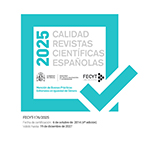Lectura hipertextual en un contexto de alfabetización académica: un estudio de caso
Resumen
Con el acceso y uso masivos de las TIC, la demanda de aplicaciones educativas se ha incrementado. En este escenario, se han conformado equipos interdisciplinarios, y se han destinado tiempo y recursos en la creación de software multimodales y el manejo de hipermedia e internet para enseñar a los estudiantes a leer, escribir y comunicarse en línea. Los resultados no solo demuestran su efectividad en la enseñanza de lenguas, sino también en la alfabetización digital, en los distintos niveles educativos. Este antecedente ha generado el interés de especialistas del ámbito de la alfabetización académica hipertextual, para responder a las necesidades que presentan los estudiantes de enseñanza superior respecto del uso de internet, específicamente en la obtención información y generación de conocimiento. Para plantear soluciones a esta situación, es preciso identificar los procesos cognitivos que desarrollan los sujetos en su interacción con la red. Ante este desafío, el presente artículo recoge los hallazgos de un estudio de caso realizado con el software Netsupport School que permiten describir la práctica de lectura hipertextual de estudiantes de Magíster en Educación. El trabajo ofrece una identificación y análisis de los procesos cognitivos desarrollados durante la realización de una tarea específica de búsqueda, selección y asociación de información en internet, para una asignatura de un Postgrado de Educación. Los resultados indican que el desarrollo de prácticas de hiperlectura es imprescindible al enfrentar las tareas académicas que exigen los estudios de postgrado en la actualidad y que un manejo deficiente de las prácticas de hiperlectura impactan negativamente en los aprendizajes de los estudiantes.
Descargas
Descarga artículo
Licencia
La Revista Complutense de Educación, para fomentar el intercambio global del conocimiento, facilita el acceso sin restricciones a sus contenidos desde el momento de su publicación en la presente edición electrónica, y por eso es una revista de acceso abierto. Los originales publicados en esta revista son propiedad de la Universidad Complutense de Madrid y es obligatorio citar su procedencia en cualquier reproducción total o parcial. Todos los contenidos se distribuyen bajo una licencia de uso y distribución Creative Commons Reconocimiento 4.0 (CC BY 4.0). Esta circunstancia ha de hacerse constar expresamente de esta forma cuando sea necesario. Puede consultar la versión informativa y el texto legal de la licencia.











